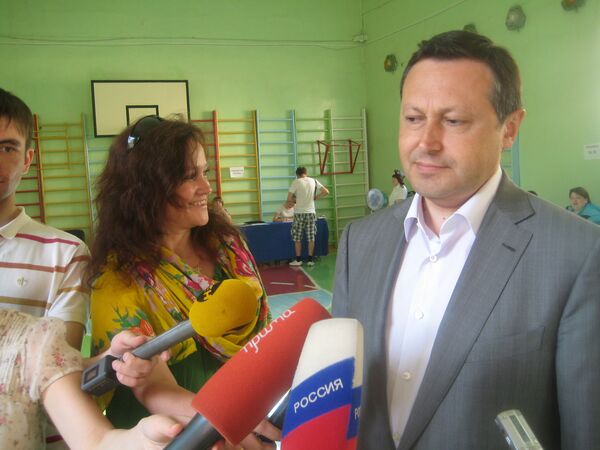There's a row of palm trees in tubs along Lenin Street in Krasnoyarsk, where scantily clad young women and men in flip-flops hurry by without sparing them a glance.
Subtropical vegetation in a city with winter temperatures below 40 celsius is one of the more eccentric legacies of Pyotr Pimashkov, longstanding mayor of the unofficial capital of eastern Siberia, which is electing his successor on Sunday after he moved on to the State Duma, Russia’s lower house of parliament.
The vote for mayor in the city of one million is in the national spotlight, because the government and Russia’s newly energized opposition are taking their standoff to the regions, after the recent federal elections triggered a wave of political unrest.
The Krasnoyarsk vote has been one of the least heated battles, but spelled a tactical landmark for the opposition, which held primaries here in order to select a champion to take on the establishment, in the shape of the pro-Kremlin United Russia party.
The primaries failed to produce a single candidate, but for the first time, several nominees voluntarily stood down in favor of the victor, setting up an important precedent for Russia, which has plenty of regional elections to come later this year.
Not Another Astrakhan
“I'll finally get some rest today, kick back and spend some time with my family,” acting mayor and ruling United Russia party candidate Edkham Akbulatov said as he cast his ballot on Sunday.
His speech took no more than a minute. Akbulatov's staff are careful to the point of paranoia about playing by the rules, which forbid any substantial public comment on the elections until the polls are closed at 8 p.m. local time.
“They don't want another Astrakhan in here,” a member of a rival campaign staff said knowingly.
Mayoral elections in the southern city of Astrakhan on March 4 ended in a PR disaster for the authorities, after an opposition candidate went on a 40-day hunger strike against alleged procedural violations that cost him his victory.
The case, which is still under review in court, furthered the damage the national election system’s reputation has suffered following opposition claims about vote rigging in favor of the ruling United Russia party at the parliamentary vote in December. The Kremlin ordered an investigation into the fraud complaints, but it has not resulted in cancellation of the vote at any polling station.
“There are also a lot of corporate interests in here, and several clans in the [regional] elite. They need fair elections to avoid conflict,” said Krasnoyarsk-based journalist and political activist Alexander Konovalov.
The People Are Watching You
To ensure fair play, all 371 polling stations in the city were fitted with electronic voting machines, considered near-impossible to rig. Some were loaned from surrounding regions – a rare practice in Russia.
A force of some 60 vote monitors gathered in Krasnoyarsk from all over the country, joining the army of 200 locals trained by grassroots activists who have been keeping watch against ballot stuffing since 2004.
Most polling stations were also put under web cam surveillance, and activists in St. Petersburg and elsewhere in the country said they will be watching the video feeds for hints of foul play.
Primaries for Everyone
A total of 11 candidates registered for mayoral elections in Krasnoyarsk, but only seven made it to the polls, the rest crossed off the 720,000 ballots by hand.
The man touted by opposition and media in Moscow as the main rival to Akbulatov is Alexander Koropachinsky, a 55-year-old real estate developer who won primaries co-staged by tycoon and political hopeful Mikhail Prokhorov.
However, there were other primaries, the most prominent of them being those won by Communist Party candidate Mikhail Oskolkov, who stayed in the race along with his opponents.
Much finger-pointing ensued, with the opposition split between Koropachinsky and Oskolkov, to the benefit of Akbulatov, who only needs to be the first past the post to win.
“It's a circus,” said Krasnoyarsk-based political analyst Alexander Chernyavsky. “Who even holds primaries in the middle of campaign and not at the start of it? If they did it the right way, they could have stood a chance.”
Memories of Winter
Voters in the streets interviewed by RIA Novosti appeared to be divided into two groups: Akbulatov supporters and those who do not care.
The latter group comprised primarily middle-age men, who declined to explain their political indifference.
Akbulatov is mostly popular with middle-aged and elderly ladies, who cite his track record of administrative work. He has been employed in the Krasnoyarsk region government since 2002 and has appeared on local television every day since becoming acting mayor in December, local political analysts say.
Krasnoyarsk has plenty of problems – traffic, ecology, lack of schools and kindergartens, and an aging utilities system. But it has also improved greatly in post-Soviet times, said local resident Svetlana Savelyeva.
“I'm proud of my city,” she said, gazing down Lenin Street, full of shops and cafes.
Some problems in Siberia, however, are beyond politics or planting palm trees.
“I'm originally from Saratov [in southern Russia], and one thing I don't like here is the cold,” said Nina, an elderly teacher who refused to give her surname.
“Cold, you know? What candidate will be able to do something about that?” she asked before trudging away on a sunlit street.



